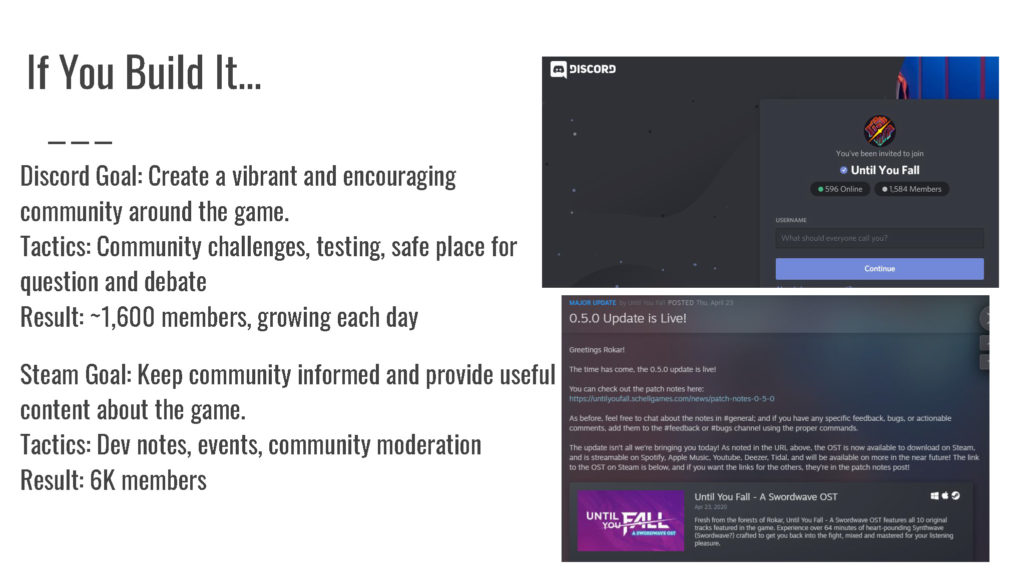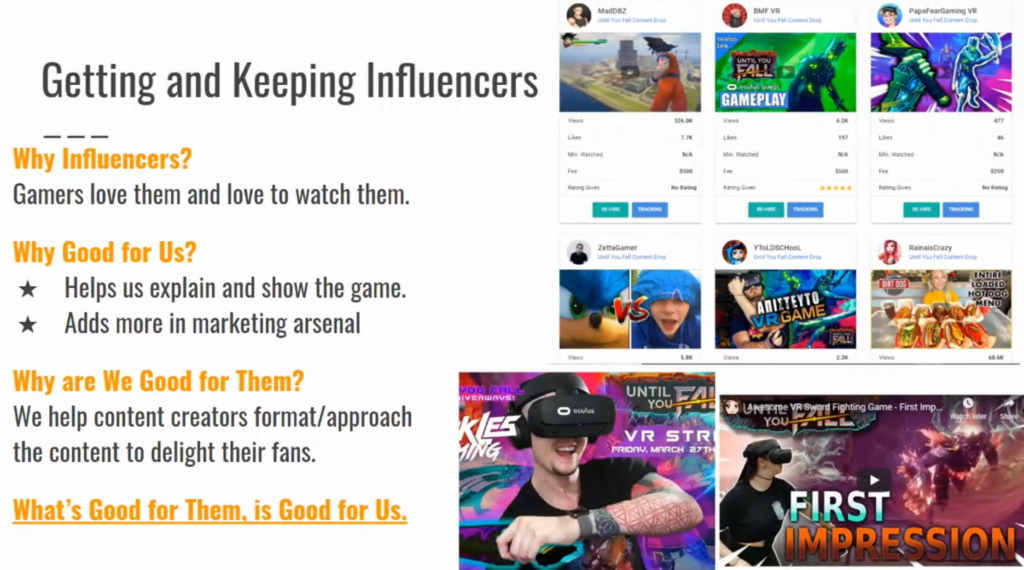In order to build rapport with an audience and create an authentic voice, marketers need to speak their audience’s language. One excellent way to do that: by using a translater. Community-building and influencer marketing are two tools to connect to your audience where they are by bringing members of that audience into your promotional ecosystem.
Dwayne Waite, Senior Marketing Associate at game development and design studio Schell Games, spoke at Found Conference on the use of content creators, community-building, and brand advocacy in content marketing strategy.
Build communities that fit your industry
Dwayne has successfully used content creators and influencers to invite new users to his brand of virtual-reality gaming — and build a fan community for his brand’s games. Dwayne quotes Seth Godin on community building: Find your tribe, give them what they want, and stay out of the way. Dwayne says he built new communities for a VR game through Discord and Reddit, as well as virtual gaming marketplace Steam. In these community threads, Dwayne finds a place to meet audiences where they are. He creates community challenges, invites users to be involved with testing, and moderates community questions and debates. He also holds online events focused on game launches and expansions. A huge part of the the game’s success: creating a place for advocates to congregate and engage with the development of Dwayne’s products.
Community marketing is centered around bringing users together — in a way that puts those users first. In a community-based setting, your organization might be at the table, but you aren’t the topic. Since the dawn of chatrooms and blogs, people with shared interests have gone online to discuss those interests. And, whether you’re a municipal agency with a presence on NextDoor or a boutique fitness studio creating content for a popular yoga YouTube channel, community marketing allows you to engage in places where customers talk about you.
Should your organization invest in community marketing? Ask yourself the following:
- Are you looking for engagement with highly-qualified potential customers? While paid advertising and traditional media might allow you to introduce your product to brand-new users, specific communities might bring users who are familiar with your products or competitors. They’ll be more likely to become customers — and more likely to have their own opinions about your role in the community.
- Do you want feedback from users? Forum-style communities are great for requesting customer input. If you’re developing a new product, you may have a captive audience delighted to assist in product development. On the flip side, if customers don’t have a good view of your brand, you’ll likely find out about it through online communities.
- Do you know where your community gathers? Although not every industry has a built-in place for fans, you can find out where your community gathers — Facebook, LinkedIn, on your site itself — and create a space for discussion.
- Do you have the resources to maintain a presence in a community channel? Monitoring a Reddit thread or Twitter hashtag takes time. Make sure you have the manpower to create meaningful content — don’t start a conversation and abandon it.
In his own work, Dwayne has incentivized users to join the community by offering extra content or in-game options to members of the game’s Discord community. Once there, members have a built-in place to give feedback on the game — and Dwayne has a spot to meet users where they are. Not every industry will have its own version of Discord, but you likely know of places where your customers meet: a Facebook page, YouTube or blog channel, or Instagram hashtag.

Use influencer marketing
Adding influencers and real-life community members is a great way to build authenticity into your content, to connect with gatekeepers and opinion leaders in your industry and to build genuine interest from a new audience. In content- and social-heavy industries, like gaming, cosmetics, or athletics, influencers can explain and demonstrate the product in a more meaningful way for your audience.
Curating and retaining influencers can be challenging, and expectations from influencers vary by industry. Below are a few concepts to keep in mind as you consider influencer relationships:
- Look for influencers who fit your brand and audience. Dwayne says he cultivates a short list of potential influencer partners by watching their YouTube, Twitch and Instagram content and looking for messaging that matches his brand’s goals. He also for high audience engagement rates and audience statistics that match his audience profiles.
- Help influencers deliver content their audience wants. Dwayne says that many influences appreciate assistance in formatting and developing content. If you have ideas that you’d love to see in your partners’ YouTube videos or Instagram streams, feel free to provide that framework. However, realize that these content creators are influencers for a reason: their voices resonate with audiences, so allow them to add that personality to the work you’re sponsoring. Remember that the goal for creators is to create content to delight their audience — and that that goal supports your goals, too.
- Know what you bring to the table. Content creators want to partner with brands: after all, they’re looking to create content. They may also ask for monetary sponsorship, links to their content on your sites, or free or discounted product. Set a budget — both in cash and in clout — that you are willing to spend on influences.
- Be flexible. Influencers have lives too! Dwayne cites one instance of a rescheduled shoot due to an influencer’s flooded apartment. Even if they’re famous among fitness fans or first-person gamers, influencers are people, too.
- Find a system to gather, analyze, and reuse. Gather the content that your creators provide, and use your analytics tools to see how that content performs. Agreements with influencers may not be long-term, and you can change your strategy as you see fit.

Influencers add to your marketing arsenal, and can demonstrate your product with an authenticity that may feel clunky coming from a branded account. In this way, influencer marketing is similar to community building — both can allow you to put users first by meeting them where they live, giving them what they want, and bringing authenticity to your brand.
If you’re looking to add content that builds a community, let us know – we can help you with topic discovery, keyword research, and channel management.

